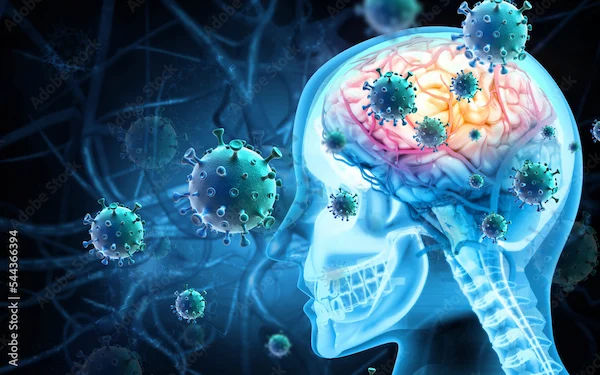Metabolic Encephalopathy Overview, Symptoms, and Treatment
Learn about metabolic encephalopathy, its symptoms, causes, and treatment options. Understand how this brain disorder develops and ways to manage it effectively.


Introduction
Metabolic encephalopathy is a condition that affects brain function due to underlying metabolic imbalances in the body. It can be alarming for patients and their loved ones, but understanding the condition, its symptoms, and treatment options can help manage it effectively.
What is Metabolic Encephalopathy?
Metabolic encephalopathy occurs when chemical imbalances in the body disrupt normal brain function. These imbalances may be due to liver or kidney disease, infections, diabetes, electrolyte disturbances, or toxins in the body. The brain relies on a stable chemical environment to function properly, and when this balance is disturbed, it can lead to confusion, memory problems, and even coma in severe cases.
Consult a Neurologist for the best advice
Common Symptoms of Metabolic Encephalopathy
The symptoms can vary depending on the underlying cause and severity but often include:
- Confusion or disorientation – Difficulty thinking clearly or remembering things.
- Mood changes – Sudden irritability, anxiety, or depression.
- Sleep disturbances – Excessive drowsiness or trouble staying awake.
- Tremors or muscle weakness – Shaking hands or difficulty moving.
- Seizures – In severe cases, uncontrolled electrical activity in the brain.
- Altered consciousness – Ranging from mild drowsiness to coma.
If you or a loved one experience these symptoms, especially if they appear suddenly, seek medical attention immediately.
What Causes Metabolic Encephalopathy?
Several medical conditions can lead to metabolic encephalopathy, including:
- Liver or kidney failure – When these organs don’t filter toxins properly, harmful substances can affect the brain.
- Diabetes (high or low blood sugar) – Extreme blood sugar levels can impair brain function.
- Electrolyte imbalances – Low sodium, potassium, or calcium levels can disrupt brain signals.
- Infections – Severe infections like sepsis can cause brain inflammation.
- Toxins (alcohol, drugs, or medications) – Overuse of certain substances can harm brain function.
- Oxygen deprivation – Lack of oxygen due to heart or lung problems can affect the brain.
How is Metabolic Encephalopathy Diagnosed?
Doctors diagnose metabolic encephalopathy through:
- Medical history and physical exam – Checking for underlying conditions.
- Blood tests – Measuring glucose, electrolytes, liver/kidney function, and toxins.
- Imaging tests (CT or MRI scans) – Ruling out structural brain problems.
- EEG (electroencephalogram) – Detecting abnormal brain activity.
Early diagnosis is crucial to prevent complications.
Get Your Health Assessed
Treatment and Management
Treatment focuses on correcting the underlying cause:
- Managing blood sugar – If diabetes is the cause, insulin or glucose may be given.
- Balancing electrolytes – IV fluids or supplements may be needed.
- Detoxification – For liver or kidney issues, medications or dialysis may help.
- Treating infections – Antibiotics or antiviral drugs may be prescribed.
- Oxygen therapy – If oxygen levels are low, supplemental oxygen may be given.
Lifestyle and Prevention Tips
While some causes (like genetic conditions) can’t be prevented, you can reduce risks by:
- Managing chronic conditions – Keep diabetes, liver, or kidney disease under control.
- Staying hydrated – Drink enough water to maintain electrolyte balance.
- Avoiding toxins – Limit alcohol and avoid drug misuse.
- Eating a balanced diet – Support brain health with nutrients like omega-3s, vitamins, and minerals.
- Regular check-ups – Monitor health conditions with your doctor.
When to Seek Help?
If you notice sudden confusion, extreme drowsiness, or seizures in yourself or a loved one, seek emergency care. Early treatment improves recovery chances.
Final Thoughts
Metabolic encephalopathy can be frightening, but understanding its causes, symptoms, and treatments can help you take the right steps. With prompt medical care and proper management, many people recover fully. Stay informed, prioritize your health, and don’t hesitate to seek help when needed.
Consult a Neurologist for the best advice
Consult a Neurologist for the best advice

Dr Debnath Dwaipayan
Neurosurgeon
9 Years • MBBS, MS(Gen. Surgery), DrNB (Neurosurgery)
Delhi
Apollo Hospitals Indraprastha, Delhi

Dr Rajesh Venkat Indala
Neurologist
10 Years • DNB, DM FAAN
Chinagadila
Apollo Hospitals Health City Unit, Chinagadila
(150+ Patients)

Dr. Sarthak Mehta
Neurologist
6 Years • MBBS , MS Mch ( Neuro )
Bengaluru
Apollo Clinic, JP nagar, Bengaluru

Dr. Ganeshgouda Majigoudra
Neurologist
10 Years • MBBS, MD ( GENERAL MEDICINE) DM (NEUROLOGY)
Bengaluru
Apollo Clinic, JP nagar, Bengaluru

Dr. Dhruv Zutshi
Neurologist
17 Years • D.M (Neurology), M.D (Medicine), MBBS
Delhi
Apollo Clinic East Of Kailash, Delhi
Consult a Neurologist for the best advice

Dr Debnath Dwaipayan
Neurosurgeon
9 Years • MBBS, MS(Gen. Surgery), DrNB (Neurosurgery)
Delhi
Apollo Hospitals Indraprastha, Delhi

Dr Rajesh Venkat Indala
Neurologist
10 Years • DNB, DM FAAN
Chinagadila
Apollo Hospitals Health City Unit, Chinagadila
(150+ Patients)

Dr. Sarthak Mehta
Neurologist
6 Years • MBBS , MS Mch ( Neuro )
Bengaluru
Apollo Clinic, JP nagar, Bengaluru

Dr. Ganeshgouda Majigoudra
Neurologist
10 Years • MBBS, MD ( GENERAL MEDICINE) DM (NEUROLOGY)
Bengaluru
Apollo Clinic, JP nagar, Bengaluru

Dr. Dhruv Zutshi
Neurologist
17 Years • D.M (Neurology), M.D (Medicine), MBBS
Delhi
Apollo Clinic East Of Kailash, Delhi




